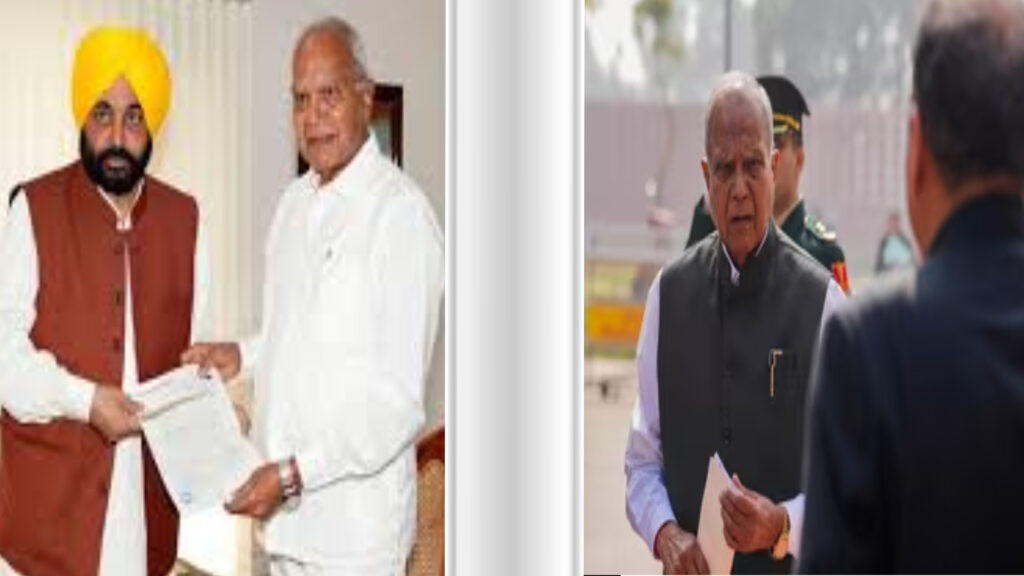Banwarilal Purohit, the Governor of Punjab and Administrator of the Union Territory of Chandigarh, submitted his resignation on Saturday, pointing to “personal reasons” for his departure. This announcement followed his recent visit to New Delhi, where he had a meeting with the Union Home Minister, Amit Shah. In a succinct communication addressed to President Droupadi Murmu, Purohit expressed his need to step down due to personal circumstances and additional commitments.
His resignation occurs amidst the backdrop of a contentious mayoral election in Chandigarh on January 30, which saw the BJP candidate, Manoj Sonkar, emerge victorious against the combined forces of the Congress and the Aam Aadmi Party (AAP). The latter raised allegations of manipulation of ballot papers by the presiding officer, adding a layer of controversy to the electoral process.
Serving since September 2021, Purohit’s tenure as the Governor of Punjab was marked by several confrontations with the AAP-led government in Punjab, especially over legislative assents and appointments, including those of university vice-chancellors. His governance period witnessed numerous instances where he withheld assent to important bills and deemed various sessions of the Vidhan Sabha illegal. These actions led to the AAP government seeking intervention from the Supreme Court on two separate occasions in 2023.
Relations between Purohit and Punjab Chief Minister Bhagwant Mann were notably strained, with both parties frequently exchanging criticisms over governance issues. The disagreements extended to the appointment of vice-chancellors for the Baba Farid University of Health Sciences and Punjab Agricultural University. Purohit’s refusal to approve the state government’s nominees and his call for the removal of the Punjab Agricultural University’s vice-chancellor due to procedural lapses resulted in Mann accusing Purohit of undue interference in the state’s administration.
The friction between the Governor and the Chief Minister intensified in February 2023 concerning the scheduling of the budget session, with Purohit seeking legal counsel on a letter he deemed derogatory and unconstitutional from Mann. Purohit’s governance style was questioned by Mann, who asserted his accountability solely to the people of Punjab, challenging the criteria for the appointment of governors.
The Supreme Court, in addressing a plea by the Punjab government regarding the Governor’s delay in assenting to various bills, admonished both Purohit and Mann for their failure to adhere to constitutional duties, urging them to respect constitutional protocols. Despite these tensions, Purohit later approved two of the three bills sent to him by the state assembly.
During his tenure, Purohit also took a stand on issues such as drug trafficking in Punjab, advocating for the establishment of village defense committees to combat drug smuggling across the state’s border districts. His stance on various issues often led to accusations from AAP members, including Mann and other cabinet ministers, alleging that Purohit was acting under the influence of the BJP and undermining the state government.
Purohit’s political career includes serving as a three-time Member of Parliament from Nagpur, reflecting his long-standing involvement in Indian politics. His actions as Governor, especially his reservation of three bills passed by the Punjab assembly for the President’s consideration in December, highlight the complexities of governance and the interplay between state and central authorities.
His insistence on high governance standards, as seen in his call for the dismissal of a minister over misconduct allegations and his vocal stance on Punjab’s drug problem, underscores the challenges faced by state leaders in balancing governance duties with political pressures.
As the political landscape adjusts to Purohit’s resignation, the focus turns to the implications for Punjab and Chandigarh’s governance, the AAP government’s legislative agenda, and the broader dynamics between state governments and the central authority in India. The departure of a key figure such as Purohit from the gubernatorial position opens a new chapter for Punjab and Chandigarh, setting the stage for the next phase of political and administrative developments in the region.
Banwarilal Purohit’s resignation as the Governor of Punjab and the Administrator of Chandigarh marks a significant turn in the political narrative of the region, highlighting the intricate relationship between state governance and the central oversight in India’s federal structure. His tenure was characterized by a series of legal and political skirmishes, particularly with the AAP government, which underscored the contentious dynamics of gubernatorial discretion and legislative autonomy. These episodes not only reflect the complexities inherent in the roles and responsibilities of a governor but also spotlight the delicate balance of power, accountability, and governance in the Indian polity.
The resignation brings to the fore the essential debate around the gubernatorial role in Indian states—whether it serves as a mere ceremonial position or possesses substantial influence over state affairs. Purohit’s active engagement in governance, regulatory oversights, and his advocacy for stringent measures against societal issues like drug trafficking, projects the governor’s office as a crucial pivot in the broader governance ecosystem, potentially acting as a check against the state government’s decisions.
As Punjab and Chandigarh navigate through this transitional phase, the focus intensifies on the selection of Purohit’s successor, the potential shifts in governance approach, and the implications for the AAP government’s future legislative and administrative agenda. This change in leadership could either pave the way for a smoother state-central relationship or further accentuate the existing tensions, depending on the new appointee’s governance philosophy and approach towards state matters.
In essence, Banwarilal Purohit’s departure underscores the nuanced interplay between political ideology, governance ethics, and constitutional duties, shaping the trajectory of Punjab’s political and administrative landscape. It prompts a reflection on the evolving role of governors in Indian states, amidst changing political tides and governance challenges, reinforcing the significance of collaborative governance and constitutional adherence in bolstering India’s democratic fabric.

